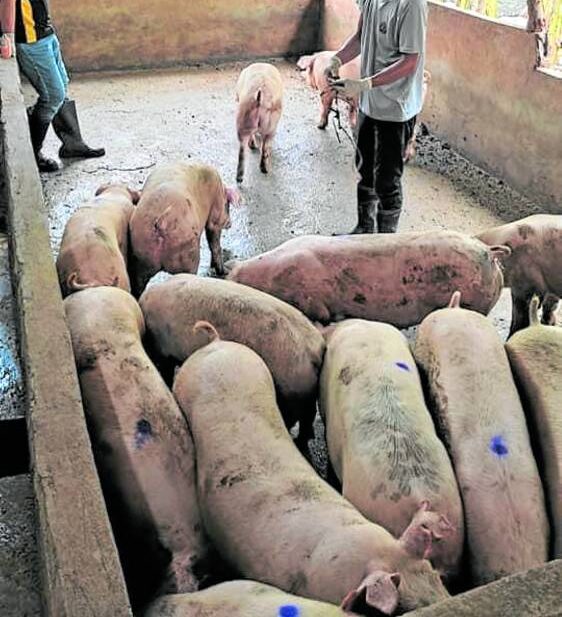Negros Oriental bans hogs, pork from Cebu

CLEANUP A pig pen in Guihulngan City, Negros Oriental, is regularly cleaned as a precaution against the spread of African swine fever. —PHOTO COURTESY OF GUIHULNGAN VETERINARY OFFICE
DUMAGUETE CITY—The provincial government of Negros Oriental has banned the entry of hogs and pork products from Cebu province and other areas where African swine fever (ASF) was detected.
Gov. Carlo Jorge Joan “Guido” Reyes said the ban would be in effect indefinitely as stated in Executive Order No. 23 which he issued on April 18. The order also prohibited the shipment of live hogs, pork, and all related products to Cebu for 30 days.
The Cebu provincial government, on March 6, first banned the entry of live pigs and pork products from Negros Island after it was initially told that the ASF contamination in Cebu was traced there.
On April 3, the Bureau of Animal Industry (BAI) reported that ASF had hit 12 areas in Cebu—the cities of Cebu, Bogo, Carcar, Lapu-Lapu, Mandaue, and Talisay, as well as the towns of Cordova, Liloan, Minglanilla, San Fernando, Sibonga, and Tuburan.
This time, the BAI announced that the provinces of Negros Oriental and Negros Occidental remained free from swine fever amid earlier reports that the virus, which was first detected in Carcar, was found in pigs that were mixed with animals from Negros Island.
Article continues after this advertisementMonitoring
Reyes ordered the strict implementation of border control and veterinary measures on cargo, meat transport vehicles, livestock, poultry transport carriers, private vehicles, and inspection of passengers across all ports of Negros Oriental.
Article continues after this advertisementHe directed the provincial veterinarian and the veterinary or agriculture offices in cities and towns to immediately dispose of all confiscated pork, pork products, and by-products through burning or any appropriate measures after documentation.
Reyes also activated the ASF task force, with at least one team assigned in each of the province’s three congressional districts, and the “Barangay Bantay ASF” would serve as the monitoring and surveillance arm of the province’s 557 villages.
Reyes said it was important for the provincial government to ensure the safety of residents and Negros Oriental’s inventory of livestock until swine fever infections in nearby provinces and regions had been contained and controlled.
ASF is a highly contagious viral disease that affects pigs, warthogs, and boars, according to the National Meat Inspection Service. It causes pigs to have a high fever and lose their appetite, with infected animals also suffering from bleeding.
Pigs die in a span of two to 10 days upon contracting ASF, and there is no known vaccine yet against the virus.
According to health officials, swine fever does not pose any threat to humans, and pork from areas where cases have been detected is safe for consumption.